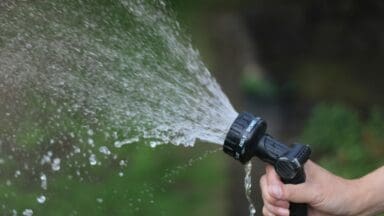
According to Yorkshire Water, the region has endured the driest and warmest spring on record, with only 15cm of rainfall recorded between February and June. This figure is significantly lower than the average rainfall expected during an average spring. Consequently, Yorkshire’s reservoir levels currently stand at just over 50%, a record low compared to the average for early July, which is approximately 80%.
In response to the ban, David Denny, Director of Research and Insights at the Horticultural Trades Association (HTA), said:
“UK environmental horticulture is a £38 billion industry that supports greener communities, public wellbeing and climate resilience. Water is essential to our growers, retailers and landscapers – and to the environmental benefits they deliver.
“The introduction of temporary water use restrictions by Yorkshire Water reflects the challenges posed by what has so far been a hot and dry year. While commonly referred to as ‘hosepipe bans’, these restrictions cover a range of water uses and are designed to safeguard supplies for the long term. We fully recognise the need to act responsibly during such periods and support efforts to conserve water. The HTA and its member businesses are at the forefront of supporting greater water resilience, for instance by investing in reservoirs, rainwater harvesting, and producing best practice guides on how garden businesses can save water.
“The regulations rightly aim to save water, whilst also still supporting people to continue to enjoy gardening. For instance, the hosepipe ban allows the use of drip irrigation systems, watering in new turf for 28 days after laying it, and exempts vulnerable people such as blue badge holders.
“Choosing drought-tolerant plants from garden centres, watering in the evening and morning, mulching flower beds, and collecting rainwater can all help gardens thrive whilst helping to conserve water. You can visit your local garden centre or speak to your landscaper if you are planning a garden landscaping project, and they will be happy to offer advice. The HTA has provided advisory information to all members of the Association of Professional Landscapers.
“As extreme weather becomes more common, we’ll continue to work with government and water companies to build resilience, calling for grant schemes to support water-saving measures and ultimately protect the UK’s green spaces.”
The impending ban will not come as a surprise, given England’s record-breaking warmest June since the driest spring in 132 years. Thames Water has issued a warning of a potential ban affecting customers across London and the Thames Valley, while Severn Trent Water has already urged its Staffordshire customers to conserve water.
Fran Barnes, the Chief Executive Officer at HTA urged the government to prioritise water resilience and to support those businesses who want to make water storage investments. “The UK cannot continue going from flood to drought and we really must focus on water storage and water distribution across the UK to deal with ever more uneven patterns of rainfall. It’s not a short-term fix but a long-term vision which is required. Demand for water is only going to increase from a growing domestic population and from the industries which service this population – including our country’s growers – ornamental and edible,” said Barnes.

